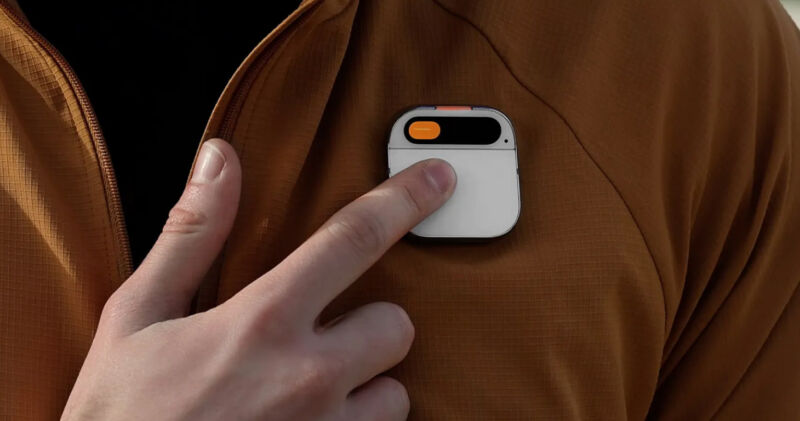
The Humane AI Pin has launched, crashed, and burned, with founders already looking to sell the company just one month after launch. The New York Times has an article detailing exactly how the company got to the point of launching a dead-on-arrival product and provided a few updates on the sales of the product and the company.
Humane, if you haven’t heard, is a company founded by two former Apple employees, Imran Chaudhri and Bethany Bongiorno, in 2018. The company raised $230 million from some big-name investors like OpenAI CEO Sam Altman and Salesforce CEO Marc Benioff, and, before launch, was valued at $1 billion. The product, the AI Pin, is sort of trying to be a Star Trek communicator. You magnetically clip it onto your shirt and can tap it for voice commands. It has “no apps” (the founders bragged about this feature) and is mostly just a voice assistant box with a touch panel, battery, camera, and speaker/microphone. There’s no traditional screen, but a laser projector can shoot a smartwatch-like UI onto your hand that you control with gestures.
The going rate for one of these things is $700, plus a $24 a month subscription, a hard sell in the face of a $400 Apple Watch. It also doesn’t really work and was universally panned in reviews, with conclusions ranging from The Verge’s “not even close” to Marques Brownlee’s “the worst product I’ve ever reviewed.” Apparently, the voice commands are very slow, the battery life is an awful two to four hours, it’s heavy and drags down your shirt, and the projector doesn’t work well in many lighting conditions. It’s also reportedly a fire hazard, with Humane emailing customers this week and telling them to “immediately stop using and charging” the battery case because some units with defective batteries “may pose a fire safety risk.”
Thanks to the Times’ reporting, we’ve got some hard sales numbers. How bad does it have to be for founders to want to exit the company? The report says, “As of early April, Humane had received around 10,000 orders for the AI Pin, a small fraction of the 100,000 that it hoped to sell this year, two people familiar with its sales said.” At $700 each, if all of those orders were filled, that’s around $7 million in revenue, plus whatever the subscription retention is. It’s hard to imagine the company making much more after the devastating reviews, press of a potential sale, and fire risks.
-
Sadly the voice does not sound like Majel Barrett.
Humane -
Normally there would be clothing in the middle of these two pieces.
Humane -
With no screen, the poor AI Pin can only communicate to the outside world via a cryptic light show.
Humane -
Whoa! It has a sci-fi laser-powered hand display! This is a fake render, and the real screen does not seem to ever be this crisp.
Humane -
In real life you have a non-flat hand, environment lighting to compete with, and not a lot of laser power, so the display was often illegible even in the professionally shot official video.
-
The website.
Humane
Despite the negative reception, Humane still wants to cling to that pre-launch valuation. The report says, “About a week after the reviews came out, Humane started talking to HP, the computer and printer company, about selling itself for more than $1 billion, three people with knowledge of the conversations said. Other potential buyers have emerged, though talks have been casual and no formal sales process has begun.” Asking for $1 billion after just $7 million in sales is ambitious, and you have got to wonder what “casual” comments they got about that price. I guess it’s good to start your negotiations high. HP has previously been suckered into buying dying tech companies like Palm (which definitely did not work out), so who knows.
If you want to know how a company makes it all the way to market with such an out-of-touch, poorly performing product, the Times interviewed “23 current and former employees, advisers and investors,” and their anecdotes shed a lot of light on how this can happen. The two founders apparently “preferred positivity over criticism, leading them to disregard warnings about the AI Pin’s poor battery life and power consumption. A senior software engineer was dismissed after raising questions about the product, they said, while others left out of frustration.” After that software engineer was fired for questioning if the AI pin would be ready for launch, the report describes a staff meeting where the founders “said the employee had violated policy by talking negatively about Humane.” It’s hard to make a good product if you can’t honestly talk about the negatives and positives for fear of retaliation.
The outside world is not subject to the founders’ preferences of “positivity,” though. After apparently not being interested in honest employee feedback during development, once the product launched, Bongiorno called the team together and said the company would have to “lean into painful feedback” and called the reviews “a gift that we’ve been given.” The problem with this thinking is that, at this point, the product had launched and received the most attention it would ever get, and nearly all of that was negative. Maybe part of the issue is that the company didn’t have a head of marketing until after launch, despite employees “repeatedly asking” for the role to be filled.
It’s unclear how much more runway Humane has left. That $230 million in funding and $7 million in sales needs to cover five years of product development, manufacturing, server time, and paychecks for a peak of 250 employees. The Pin is still for sale at the normal $700–$800 price; the next step ought to be a fire sale of the remaining inventory.



/cdn.vox-cdn.com/uploads/chorus_asset/file/25499389/anker_prime_power_bank.png?w=1200&resize=1200,0&ssl=1)